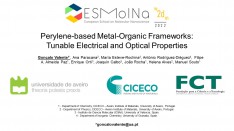abstract
Besides their inherent porosity, Metal-Organic Frameworks (MOFs) may also incorporate tuneable electrical and optical properties which strongly depend on the selected building blocks, becoming very attractive for their implementation as integral components in electronic devices.[1] In recent years, electroactive organic molecules have emerged as promising building blocks for the design and construction of crystalline porous frameworks such as MOFs for different applications in electronics.[2] In this direction, the construction of new perylene-based MOFs is encouraged due to their remarkable luminescence and promising electrical properties. Herein we report the electrical conductivity enhancement of an iodine-doped perylene-based MOF by using two-probe single-crystal devices (Figure 1). This conductivity enhancement is ascribed to the partial oxidation of the perylene ligands, as witnessed by spectroscopic studies and supported by theoretical calculations. The charge transport is described by means of a through-space hopping mechanism along the herringbone perylene packing, with highest conductivities of the order of 10−5 S·cm−1 measured in two-contact single-crystal devices.[3] In addition, we present a new synthetic route to prepare a new family of isostructural perylene-based MOFs with different transition metals (TM = Co, Ni, Zn) exhibiting tuneable optical properties depending on the nature of the metal. We demonstrate the possibility to tune the optical properties by switching the TM while the electrochemical properties of perylene are preserved, as demonstrated by solid-state cyclic voltammetry of PTC-TM.[4] These studies highlight the great versatility of perylenes as building blocks for the construction of electroactive MOFs. [1] M. D. Allendorf, R. Dong, X. Feng, S. Kaskel, D. Matoga and V. Stavila, Chem. Rev., 2020, 120, 8581. [2] M. Souto, K. Strutyński, M. Melle-Franco and J. Rocha, Chem. Eur. J., 2020, 26, 10912. [3] G. Valente et al. 2022, submitted. [4] G. Valente et al. 2022, manuscript in preparation.
authors
Gonçalo Valente, Ana Paracana, María Esteve-Rochina, António Rodríguez-Diéguez, Filipe A. Almeida Paz, Enrique Ortí, Joaquín Calbo, João Rocha, Helena Alves, Manuel Souto



